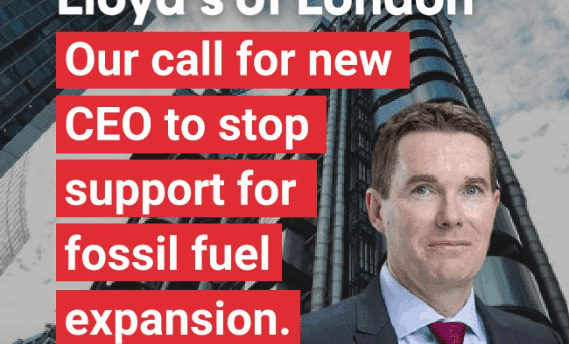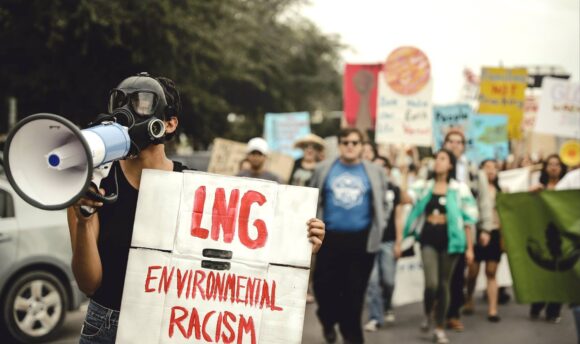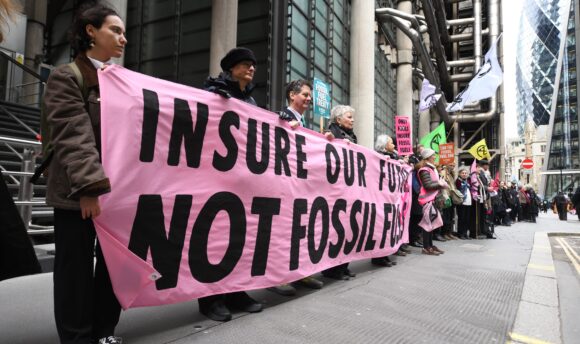Writing in the Times on 24 April, 2023 faith leaders called on the world’s largest insurance market to “show leadership” by ending insurance for all new fossil fuel projects. The text of the letter is below.
Dear Bruce Carnegie-Brown and John Neal,
As representatives of UK faith organisations, we are writing to you to ask Lloyd’s of London to accelerate its action on climate change in response to the escalating threat we all face.
Catastrophic climate impacts are now a present reality for communities around the world. The International Energy Agency (IEA) reported in 2021 that under a 1.5 degree scenario, there can be no new coal, oil or gas development.¹Last year, UN Secretary-General António Guterres said “Investing in new fossil fuel infrastructure is moral and economic madness.”² Last month, in the synthesis of its Sixth Assessment Report, the Intergovernmental Panel on Climate Change warned that “[t]here is a rapidly closing window of opportunity to secure a liveable and sustainable future for all.”³ The decisions we make now will echo for many hundreds of years.
Those who offer financial backing and social legitimacy to new fossil fuel projects now have an urgent moral responsibility to change course. We believe this duty extends to all sectors and all parts of society. We also see that those, like Lloyd’s, with significant influence can put our whole world on a safer trajectory by showing leadership now.
The ten most expensive climate disasters in 2022 cost a combined $168 billion, mostly in insured losses; the true cost is much higher.⁴ In just the first few months of 2023, we have seen flooding and landslides in Brazil, Mozambique and California, cyclones in Vanuatu, Malawi and Madagascar, extreme temperatures of -33°C in Afghanistan and an unprecedented winter heatwave in Europe. There is no longer any possible moral justification for continuing to profit from fossil fuel expansion when the evidence of its catastrophic impacts is so clear.
In our faith communities, we are doing our best to live up to our own responsibilities, by drawing on the wisdom of our faith traditions to make the case for climate action, supporting practical projects to cut emissions, and showing solidarity with our brothers and sisters around the world who are bearing the brunt of the climate crisis. Many of the institutions we represent have divested our own assets from fossil fuels.
Lloyd’s has power and influence of a different kind. As the world’s largest insurance market, where a large portion of global energy sector insurance cover is written, the Lloyd’s market Lloyd’s of London, 1 Leadenhall Street, London, EC3V 1AB has a unique significant and global role to play in either continuing to support fossil fuel projects and climate destruction or to support a speedy transition to renewables.
We welcome your introduction of guidelines on phasing out insurance for coal and tar sands. However, we are concerned that these guidelines remain voluntary for Lloyd’s members, and that as yet you have no policy on conventional oil and gas.
Other major (re)insurers including Allianz, Swiss Re and Munich Re have recently announced they will no longer provide coverage for new oil and gas. We encourage you to follow their example and:
- commit to ending insurance for all new fossil fuel projects, in line with the recommendations of the Intergovernmental Panel on Climate Change, the IEA, and the UN Secretary-General
- commit specifically to not providing (re)insurance for the East African Crude Oil Pipeline
- announce a timeline for phasing out existing fossil fuel insurance which is in line with the remaining carbon budget for 1.5 degrees.
We hope these issues will be considered at your forthcoming AGM. We would welcome a response from you and would be pleased to meet to discuss this further.
Yours sincerely,
Dr Husna Ahmad, CEO, Global One
Nicola Brady, General Secretary, Churches Together in Britain and Ireland
Olivia Fuchs, Coordinator, Eco Dharma Network
Canon Giles Goddard, Chair, Faith for the Climate
Revd Dr Darrell D Hannah, Chair, Operation Noah
Michael Hutchinson, Clerk, General Meeting for Scotland (Quakers)
Paul Parker, Recording Clerk, Quakers in Britain
Dr Shanon Shah, Director, Faith for the Climate
Kamran Shezad, Director, Islamic Foundation for Ecology & Environmental Sciences
Lord Singh of Wimbledon, Director, Network of Sikh Organisations
Elizabeth Slade, Chief Officer, General Assembly of Unitarian and Free Christian Churches
Avnish Thakrar, National Coordinator, Hindu Climate Action
Rt Revd Dr John B Thomson, Bishop of Selby
Deborah Tomkins, Co-Chair, Green Christian
Patrick Watt, Chief Executive, Christian Aid
Rabbi Jonathan Wittenberg, Senior Rabbi, Masorti Judaism UK and co-founder, Eco Judaism
Kaspa Thompson, Bright Earth Buddhist Temple
Satya Robin, Bright Earth Buddhist Temple
Olivia Graham, Bishop of Reading
Rev Dr Dave Gregory, Former President of the Baptist Union and Convenor of BUEN (Baptist Union Environment Network)
Jamie Cresswell, Director, Centre for Applied Buddhism
Revd Michaela Youngson, Assistant Secretary of Conference, The Methodist Church
Revd Dr John P Bradbury, General Secretary, United Reformed Church
Dharmachari Shantigarbha, Convenor, Triratna Earth Sangha
Endnotes
1 Net Zero by 2050 – Analysis (IEA)
2 Investing in new fossil fuels is ‘moral and economic madness’ – UN chief (energyvoice.com)
3 AR6 Synthesis Report: Summary for Policymakers Headline Statements (ipcc.ch), paragraph C.1.
4 Counting the cost 2022: A year of climate breakdown (PreventionWeb)



